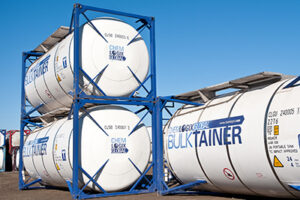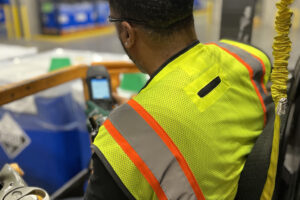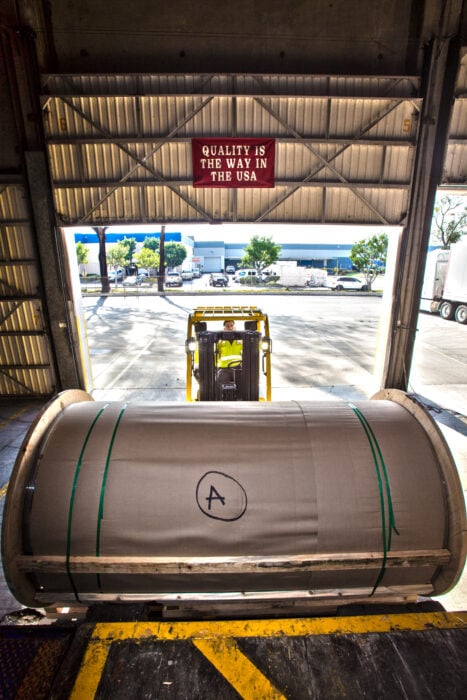Chemical Logistics: Formulating Solutions

As chemical production increases in the United States, logistics providers drum up solutions to transport these critical shipments safely, efficiently, and accurately—leveraging specialized expertise and experience.
About 992 million tons of chemical products were transported across the United States in 2021, and the chemical industry is one of the country’s largest exporters, according to the American Chemistry Council (ACC). Despite the chemical industry’s size and significance, it hasn’t been immune to the challenges that have affected many industries.
In a recent ACC survey, 93% of respondents said supply chain and transportation disruptions were impacting U.S. chemical manufacturing. More than one-third of companies said customers canceled orders over concerns that they either wouldn’t arrive or wouldn’t arrive on time.
Several factors are behind these numbers, including a limited driver pool, inflation, and challenges in specific transportation modes, as well as new technology and a growing focus on sustainability.
The dwindling number of truck drivers particularly impacts producers and logistics providers that focus on the chemical industry as drivers hauling chemicals and hazardous materials must meet additional safety requirements.
Safety concerns also make it difficult for chemical companies to turn to the spot transportation market. “In the chemical industry, you want contractual relationships with asset providers you know and trust, and that have solid safety records,” says Glenn Riggs, chief strategy officer with Odyssey Logistics.
Rising wages have impacted chemical logistics providers, just as they have many other companies. “The cost to operate trucking and logistics companies has grown exponentially,” says Jennifer Braun, vice president, Kansas City Regional Service Center with Trinity Logistics.
The National Association of Chemical Distributors (NACD) has urged Congress to enhance workforce programs that ensure well-trained drivers can remain on the road, says Eric Byer, the group’s president and CEO. This includes preserving the independent contractor (IC) business model on which many truck owner-operators rely. “By securing a strong workforce and protecting the IC system, we can ensure the smooth movement of goods and maintain businesses’ control over their own fleets,” he adds.
Accessing new equipment also can be challenging, says Scott Buber, director, operations, chemical division and regulatory compliance, with WSI. For instance, his company purchased six new lifts, and the lead time is 18 months, up from about two months a few years ago.
“Even scan guns and bluetooth communicators have lead times of six to eight months,” he says. WSI was able to shift additional equipment from other locations to support its operations, or secure temporary equipment.
The “bullwhip effect” has also upended chemical supply chains, says Matt Jensen, vice president, global warehousing, with Rinchem Company. The bullwhip effect describes how small changes in demand at the retail level are magnified as they move up the supply chain to the manufacturing sector.
During COVID, companies scrambled to meet spiking demand. Then, even as demand leveled out, companies continued to produce, often at higher volumes, leading to an inventory glut.
Pivoting Becomes Crucial
As demand has moderated, the ability to pivot has become key. “Instead of continuing to send shipments via a rail car with bulk tankers, when it’s not needed, why not do a different mode—say, tank truck transportation or in a tote or drum?” asks Curt Gonya, senior vice president of logistics with KAG Logistics. This would cut transportation costs and better align logistics operations with inventory and production levels.
Along with a willingness to pivot, embracing advancing technology is crucial to streamlining operations and driving efficiency. Software solutions, like predictive analytics, help companies react more quickly to changes in their markets or transportation modes, and then to meet the evolving needs of their customers.
At the same time, implementing new solutions, and overcoming any resistance, often requires an investment of time and resources. What’s more, some business customers expect suppliers to implement their proprietary systems and technology platforms. “If you want to remain a valued business partner, you need to learn, comply, and train your staff on myriad technology platforms,” Braun says.

Around 19% of chemical shipments travel by rail. The Railway Safety Act of 2023 addresses safety requirements for rail carriers and trains carrying hazardous materials.
Chemical Transport Via Rail
About 19% of chemical shipments travel by rail. Yet rail transportation often remains a challenge, due to some rail lines’ inability to meet service expectations. “Our members want to move more by rail, but reliability issues make that increasingly difficult,” says Scott Jensen, director of issue communications with the ACC.
One potential solution would be to allow reciprocal switching, Jensen notes. Reciprocal switching would allow shippers to request that their cargo move from one rail line to another when it hits an interchange, instead of automatically continuing on the same line.
Overcoming Rail Challenges
Implementing reciprocal switching would force all the rail lines to earn shippers’ business, versus simply expecting it. The Surface Transportation Board, which regulates much of freight rail, has the issue on its to-do list, Jensen adds.
The recent rail derailments brought attention to the challenges of moving hazardous materials and chemicals. While moving chemicals via train is generally safe and efficient, “the derailments were a huge black eye for the industry,” Buber says.
The Railway Safety Act of 2023, introduced in the Senate in March 2023, may offer improvements. It addresses safety requirements for rail carriers and trains transporting hazardous materials. Among other actions, it increases the maximum fines the Department of Transportation may impose on rail carriers for violating safety regulations, and requires a minimum two-person crew for certain freight trains. The bill has received bipartisan support.
Until recently, logistics providers moving chemicals focused primarily on safety, cost, and service. “Sustainability typically wasn’t a decision factor,” Riggs says. That’s changing.
Sustainability Gains Ground
The chemical industry has steadily improved its environmental footprint. The Responsible Care initiative has driven a 12% decrease in greenhouse gas emissions, an 18% decrease in sulfur oxide emissions, and a 39% drop in nitrogen oxide emissions, all since 2017, the ACC says. Responsible Care, the industry’s environmental, health, safety, and sustainability initiative, is practiced in nearly 70 countries.
At the same time, the systems implemented to cut the environmental impact often add costs. “It’s worth doing, but it’s not free,” Braun says. For instance, some ports and shippers will only allow trucks that are within a certain age range.
Looking Ahead
“This year, everyone is holding their breath, waiting to see what the economy is doing as their customers are drawing inventory down and also waiting to see what is going to happen,” says David R. Vieira, president and chief executive officer with CLX Logistics.
Moving forward, technology will play an even more critical role in chemical supply chains. More chemical logistics providers will use sensors to measure humidity, temperature, and other qualities during transportation and storage. “Hyper-visibility into supply chain conditions will grow,” Jensen says.
The CHIPS and Science Act, among other changes, provides $52.7 billion for American semiconductor research, development, and manufacturing. It’s likely to affect chemical supply chains, as semiconductor manufacturing is a significant user of chemicals.
As more semiconductor factories operate in the United States, they’ll likely find it more efficient to bring materials from within the United States, versus from other parts of the globe. Companies may decide to hold less inventory if shipping takes only a few days, rather than multiple weeks, says Dustin Miles, vice president of global transportation with Rinchem Company.
As chemical production increases in the United States, so will the chemical transportation sector. The ACC is projecting about 1 million additional shipments annually by 2030.
The logistics providers dedicated to the chemical industry will continue to innovate, to leverage effective shipping solutions, and to apply their experience and insight to ensure they can move shipments safely, efficiently, and accurately.

Chemical companies turn to ChemLogix to build and deliver transportation solutions that meet regulatory requirements as well as safety and security concerns.
CLX Logistics: Creating Sustainable Economic Value
“As a third-party logistics and technology company with a focus in the chemical industry, we strive to drive economic value in all our relationships,” says David Vieira, president and chief executive officer. CLX accomplishes this by combining expertise and experience, best-of-breed technology, and a personal, dedicated approach.
ChemLogix is CLX’s industry-recognized chemical 4PL division and the origin of CLX Logistics. Because of its extensive experience in chemical logistics, chemical companies across the globe trust ChemLogix to build and deliver transportation solutions that meet their unique regulatory pressures, as well as safety and security concerns.
CLX’s global transportation management system with partner e2open covers all modes and regions, enabling chemical shippers to plan, execute, and optimize transportation operations and ensure delivery performance to partners and customers anywhere in the world, while complying with relevant regulations and maximizing efficiency.
The system also provides advanced visibility and control over day-to-day transportation operations. Through its interactive dashboards and real-time metrics, shippers can identify outliers and trouble spots that need attention—before they become challenges.
Managed Transportation, a robust suite of CLX Logistics solutions including mode management, digital freight brokering, and analytical tools, helps chemical manufacturers lower costs and boost service. Operations in North America and in Europe are expanding globally for road, rail car management, and bulk liquid intermodal, with specialization in hazardous materials handling and movement.
By working with CLX LaneLogix™ chemical supply chain professionals can more effectively manage their procurement functions to reduce spending and boost margins. Among other capabilities, the CLX database, which is fed daily market updates, can predict rate competitiveness and provide comparable market service requirements.
LaneLogix™ also allows chemical shippers to evaluate carriers and conduct electronic bids.
Boosting Visibility
CLX partnered with a large Dutch chemical company whose annual transportation spending topped $100 million. The company wanted to compare its transportation rates with its competitors, and then optimize them.
Working with the company, CLX leveraged LaneLogix™ to boost visibility and enable faster, more optimized bidding and procurement solutions. Among other benefits to the company, LaneLogix™ identified savings of $9 million, offered greater supply chain visibility, and enabled enhanced decision-making.
CLX Gravity, a transportation analytics solution, extends traditional analytics to provide comprehensive data integration capabilities that combine information from both internal and external sources.
Decision makers can close the gaps between visibility, performance, spend and risk, and then use data-driven insights to build and sustain a next-generation supply chain.
Through CLX Logistics’ intermodal logistics solutions, chemical companies can drive cost reductions of up to 30% when compared to over-the-road chemical shipments. In addition, intermodal offers fewer driver capacity constraints and can cut companies’ overall carbon footprint, among other benefits.
Along with its services and technology solutions, CLX employees are critical to its—and its clients’—continued success. The logistics experts within CLX Logistics truly partner with their clients to strategize and craft informed, custom plans that increase performance and reduce costs.
As the chemical logistics sector evolves, CLX does as well, continuing to help its clients cut costs, boost service, and improve their performance.
“We’re expanding our global freight forwarding operations, our project cargo program, our artificial intelligence capabilities, and our European operations outsourcing,” Vieira says. “At CLX, we are always innovating to help shippers and manufacturers succeed.”

IFS Freight helps companies of all sizes address shipping challenges with comprehensive over-the-road services. From left to right: Dan Witt, CEO; Jason Turley, vice president, sales and operations; and Ronnie Glover, professional driver.
IFS Freight: Logistics Problem Solvers
About 18 years ago, Dan Witt started IFS Freight after a long career in logistics, much of it managing transportation with large corporations.
His experience offered him an inside look at the dearth of solutions available to help small and mid-sized businesses better manage their transportation costs and systems.
“I wanted to help small businesses save money, make their processes more efficient, and make a little money for myself,” he says.
Among other services, IFS offers truckload (TL) brokerage, less-than-truckload (LTL) freight management, and connections to intermodal options, Witt says.
Witt started by evaluating the transportation profile of his first client, a small metal distribution company, and then helped it shift from using one LTL provider exclusively to considering additional carrier options, to both improve service and cut costs.
“We were able to save this small business 25% in annual transportation spend by implementing our logistics platform,” he says.
Since then, IFS Freight has grown by helping clients of all sizes address their challenges with comprehensive over-the-road shipping services.
Most smaller companies have similarly small transportation departments. Trying to identify which of the many LTL carriers is best for a particular shipment can be next to impossible. IFS’ Intelli-Freight™ system allows these businesses access to all carriers in their market.
Once logged into Intelli-Freight™, a shipper can enter its shipment parameters, such as origin and destination, and time frame. Intelli-Freight™ reaches out to carriers to ask them if they service the lane in question, and the estimated transit time and cost. Based on the responses, the shipper can identify the carrier that best meets its needs.
“Within seconds, shippers can get rate quotes and book a shipment. The technology streamlines the process and helps companies make intelligent freight decisions,” Witt says.
One reason IFS entered the chemical logistics space was because Witt noticed the troubles his existing clients were having getting timely deliveries. One customer said he had to send home about 100 people working in its manufacturing plant, because a bulk shipment of materials didn’t show up as promised.
A Focus on Service
IFS is a service-oriented, non-hazardous material carrier that offers stellar on-time performance. “We’re very service-sensitive,” Witt says. “When a customer says ‘we need it delivered tomorrow at 10 a.m.’ we deliver at 10 a.m.”
At the same time, Witt knows these trips aren’t worth doing unless they’re done safely. IFS drivers generally run the same routes across the southeastern United States. The drivers know the routes, which helps boost their safety performance.
In 2014, one of IFS’ customers, a producer of arts and craft paint, was having difficulty obtaining the raw materials it needed for its production.
IFS went into action. It began handling logistics for the company, including TL brokerage and LTL freight management, as well as transporting their raw materials as a liquid bulk non-hazmat carrier.
“The manufacturers have a lot of moving parts. IFS coordinates inbound and outbound shipments, making it easier for the company to manage,” Witt adds. The changes improved service to their production plant and to the company’s customers, while also cutting annual transportation spend.
As a smaller logistics provider, IFS can move quickly to help clients not only with day-to-day operations, but in navigating emergencies and sudden changes.
“We’re available to customers,” Witt says. “And we’re small enough that we actually answer the phone when people call.”

As one of the first managed transportation and logistics providers in the chemical sector, KAG Logistics provides experience and technology that aligns with chemical industry best practices.
KAG Logistics: Industry-Leading Transportation Management Solutions
As one of the first managed transportation and logistics providers in the chemical sector, KAG Logistics brings deep experience and technology that’s aligned with chemical industry best practices. It’s a subsidiary of the Kenan Advantage Group, Inc., a leading tank truck transporter in North America.
KAG Logistics provides value-add logistics services for supply chains throughout North America, including those in the petroleum and renewable energy, chemicals, specialty products, and industrial gases sectors. Its services, including transportation management and technology, freight brokerage, and value-added logistics services, along with its team of experts, help shippers boost their performance.
The Optimate Transportation Management System from KAG Logistics integrates technology, process, and expert logisticians to help shippers design plans that are optimized for capacity and carrier options and can reduce total transportation costs.
The system also offers contract rating and route guides built on business rules and logic, as well as the ability to track all goods in transit. Optimate can integrate with shippers’ systems and business processes, and its drill-down metrics and customizable reports let shippers evaluate carriers’ performance, financials, and key performance indicators.
Expanding Solution Sets
KAG Logistics is investing heavily in technology, and especially in solutions that enable the broad assimilation, focus, and utilization of data. “There’s a heightened urgency to support big data and help improve customers’ operations,” says Curt Gonya, senior vice president of logistics for KAG Logistics.
By continuing to build out and refine its capability solution set, KAG Logistics can continue to offer its customers a range of ways to move chemicals efficiently and at lower cost. “This will ultimately provide our chemical customer base with the optionality, scalability, and resources needed to support any supply chain initiative,” Gonya adds. “We can help our customers change the way they do business, so they stay competitive.”
KAG Logistics is also heavily focused on its robust and diverse carrier management team, which possesses deep experience across multiple modes. These qualities have become key as the market continues to shift, and shippers need access to multiple modes so they can move their products as efficiently as possible.
When a large shipper faced packaging disruptions within its supply chain, KAG Logistics proactively offered multiple mode and scheduling options. This included helping the company initiate nearshoring operations so it could support demand changes across its North America network and avoid production line shutdowns and delays.
KAG Logistics’ ability to act quickly, to help the shipper pivot its production, and to provide quality carrier management and ongoing improvement to the customer’s operations helped it earn the supplier of the year award from the company.
To continue to support its customers, KAG Logistics remains focused on advancing transportation technology, and particularly on solutions that can leverage big data.
“Technology and data can help us—and our shippers—work smarter, boost efficiency, and drive performance,” Gonya says.

Odyssey Logistics’ suite of chemical logistics services includes its bulk tank carrier network, bulk intermodal services, and network optimization analyses.
Odyssey Logistics: Committed to the Chemical Logistics Market
For the past 20 years, Odyssey Logistics has been a leading chemical logistics provider, relied on by top chemical companies as they move products across the country or around the globe.
It’s also certified by the American Chemistry Council as a Responsible Care® partner company. “Odyssey got its start in chemical logistics as a multimodal and global 4PL, and we’ve continued to build out and acquire other services to help meet all our clients’ needs,” says Glenn Riggs, chief strategy officer.
In working with chemical shippers, Odyssey is “agnostic to mode,” Riggs says. The Odyssey team looks at a range of multimodal solutions to identify the optimal path for moving each client’s products, he adds.
Odyssey is able to take a comprehensive view because its experts offer in-depth knowledge of the chemical logistics environment, along with a commitment to understanding and staying abreast of the laws and regulations that govern the transportation of hazardous and non-hazardous products.
The company’s extensive suite of chemical logistics services, including its bulk tank carrier network, bulk intermodal services, and network optimization analyses, allows it to offer a solution for every element of its clients’ chemical supply chains. In all its partnerships, Odyssey remains dedicated to safety, timeliness, and cost-effectiveness.
The chemical sample fulfillment and logistics service Odyssey offers has processed more than 12 million sample shipments. More than 65 major manufacturers rely on this service, which is available to shippers around the globe, enabling them to efficiently store, package, and ship samples and small revenue orders.
Odyssey has invested heavily in its intermodal capabilities. Its chemical ISO tanks, which can move up to 6,600 gallons, fit in the same frame as 20-foot trucking containers. “This allows us to efficiently and safely move shipments from truck to rail or ship and back again,” Riggs says. By leveraging intermodal capabilities, Odyssey takes trucks off the road, leading to a greener footprint.
Global Expertise
The insight and visibility customers can gain through Odyssey’s advanced analytical services and network optimization studies help them evaluate and improve the performance of their global supply chains. Odyssey helped a global manufacturer gain visibility into its $1 billion annual shipping budget by creating a digital twin of its distribution network and then applying advanced modeling software.
By highlighting inefficiencies and identifying actions to better manage sourcing and lead times, among other areas of improvement, the analysis identified $60 million in potential savings. What’s more, this analysis occurred during the pandemic and was conducted remotely, saving another $150,000 in travel costs.
Cloverleaf, Odyssey’s science-based sustainability program, leverages cutting-edge analytical tools and technology to calculate fuel consumption and emission by mode. “We’re seeing a growing trend of customers who want to measure and calculate their carbon footprint, and this program helps them do that,” Riggs says.
Odyssey continues to view the chemical market as significant. “We’re continuing to invest in it, to grow it, and to evaluate acquisitions,” Riggs says. “We’re committed to it.”

Asset-based logistics provider Rinchem focuses on the chemical industry. Every client is a chemical company and most employees have a chemical logistics background.
Rinchem Company: Streamlining the Global Chemical Supply Chain
In contrast to many other large logistics providers, Rinchem “doesn’t chase the holidays,” says Dustin Miles, vice president of global transportation. Because Rinchem focuses on the chemical industry, its capacity remains stable year-round, he says. Every client is a chemical company and most employees come with a chemical logistics background.
Rinchem leverages its four decades of expertise, thought leadership, and logistics transparency, complemented by state-of-the-art technology, to provide chemical companies with reliable, safe, efficient, and cost-effective solutions. “No matter the challenges our customers must tackle, we look for ways to say ‘yes’ and provide options to solve the issues,” Miles says.
The company’s services include trucking, freight forwarding, warehousing, return logistics, and inventory management. As an asset-based logistics provider with a network of 27 chemical and gas distribution centers, Rinchem can warehouse and/or transport shipments coming from across town or across the globe.
“We offer flexibility and door-to-door supply chain management,” Miles says. Through its breadth and depth of services, Rinchem helps clients run leaner supply chains.
As important, Rinchem’s focus on both innovation and safety has led to a total corporate injury rate (TCIR) of less than one. That compares to an industry average of about five, says Matt Jensen, vice president, global warehousing.
Chem-Star®, the company’s proprietary, web-enabled warehousing and transportation management system, provides visibility across Rinchem’s global network of warehouses, which are temperature-controlled and compliant with hazardous materials regulations.
The GPS tracking capabilities within Chem-Star® also offer visibility to Rinchem’s fleet of customized, temperature-controlled, and hazmat-compliant trucks and trailers, as well as its extensive team of hazmat-trained drivers. “The software provides door-to-door visibility, enabling shippers to make proactive decisions,” Miles says. Chem-Star also offers numerous real-time inventory queries and reports.
Enabling Coordination
To improve warehouse receiving and picking speed and accuracy, Rinchem employs radio frequency technology. Its systems can interface with numerous ERP or inventory management systems. This boosts visibility and enables seamless data transfers and coordination across chemical manufacturers’ entire supply chains, so they may be able to reduce safety stock and cut inventory obsolescence and non-value-added activities.
In March 2023, Rinchem announced the development of a technology that revolutionizes how chemical companies track and report regulated materials. The technology, which will track all CAS Registry Numbers for regulated items, was done in partnership with CAS, a division of the ACC. “We’re the first to do something like this,” Jensen says.
Given its strong performance and the growing chemical market, Rinchem remains committed to expansion. In 2023, it is opening new facilities in Oregon and Arizona in the United States, as well as in Malaysia. “Our strategy is to grow where customers need us to go,” Jensen says.
“We want chemical providers to focus on producing chemicals, rather than spending time finding out where their orders are,” Miles says. “So, we provide a one-stop shop for chemical manufacturers.”

Trinity Logistics works with chemical companies of all sizes, helping them manage their supply chains and navigate the complex regulatory environment that governs chemical production, distribution, and transportation.
Trinity Logistics: Improving Lives in Supply Chain by Solving Tough Problems
Over the more than 40 years Trinity Logistics has been providing logistics services, it has relied on a blend of people-centric service and technology. “It’s not one or the other,” says Jennifer Braun, vice president of the company’s Kansas City Regional Service Center.
Eight values—teamwork, integrity, legacy, fun, continuous improvement, excellence, determination, and leadership—guide employees’ partnerships with customers, carriers, business partners, and each other.
Over the decades, Trinity has worked with chemical companies of all sizes, helping them manage their supply chains and navigate the complex regulatory environment that governs chemical production, distribution, and transportation. It can manage many types of shipments, including truckload, less-than-truckload, expedited, drayage, and multimodal.
Custom Technology Solutions
Trinity’s custom technology solutions provide critical visibility and connections. Through its customer portal, shippers can access live tracking updates on shipments, set tracking notifications, access invoices and documents, and make invoice payments, among other functions.
Trinity’s transportation management system (TMS) also provides clients information and visibility to their freight shipments, enabling them to make proactive decisions. It also helps chemical shippers manage their extended supply chains, including their internal logistics departments, suppliers, carriers, and warehouses, among others, gaining control and visibility, Braun says.
The system also enables shippers to evaluate various metrics, like cost per pound shipped. They can determine how rates might be impacted by changes, such as by shipping to different regions or consolidating LTL to truckload shipments.
Trinity also works with its shippers to help them achieve their sustainability and environmental goals. It has been a Responsible Care partner since 2009 and is certified through the NACD’s Responsible Distribution program, an environmental, health, safety, and security program.
Through its participation in the EPA’s SmartWay program, Trinity advances supply chain sustainability by measuring, benchmarking, and improving its freight transportation efficiency.
Over the past six months, Trinity has helped several companies whose containers of imported goods remained stuck at U.S. ports. In some cases, the companies had lost critical warehousing or transloading information.
Trinity was able to access and retrieve the loads, provide drayage service, and transload and truck them to their destinations. By providing access to goods that previously had been detained at the ports, Trinity helped both its clients and their customers.
One Trinity client ships goods that must be protected from freezing during winter months; this essentially eliminates LTL as an option during cold weather. Trinity helped the company consolidate 160 LTL shipments to 53 multi-stop, truckload shipments.
“They didn’t have to wait for the weather to warm to make the shipments,” Braun says. Even better, the changes saved the company almost $50,000.
By emphasizing people-centric service and technology, and committing to a servant-leadership model, Trinity continues to capture business from leading companies across multiple industries, including the agricultural, industrial, pharmaceutical, and coatings sectors. It continues to expand its footprint, with new offices in Arizona and California.
The Trinity Foundation, an independent non-profit, has given more than $600,000 to the communities in which Trinity operates.

WSI has four certified chemical warehouses across the United States that are available for public lease, as well as additional private chemical warehouse facilities. Its services extend beyond the facilities.
WSI Supply Chain Solutions: Absolute Reliability
In the 1960s, six lift truck operators noticed an opportunity as they worked in a coated paper mill: The mill had no place to store the paper. The group brainstormed ideas, pooled their resources, and built the first warehouse in Combined Locks, Wisconsin. (Its current population: 3,641). This was the beginning of Warehouse Specialists, known today as WSI. It’s one of the largest privately held logistics companies in the United States, with operations in 10 states.
Material Logistics & Services, WSI’s chemical handling subsidiary, has extensive experience working with hazardous materials and is a Responsible Care Partner. “We have a strong commitment to the environment,” says Scott Buber, director, operations, chemical division and regulatory compliance.
That includes within its own operations, where WSI has cut energy use by installing more efficient lighting and water systems, among other steps.
WSI offers four certified chemical warehouses across the United States that are available for public lease, as well as additional private chemical warehouse facilities. Its services extend beyond the facilities.
“We’re not just a warehouse,” Buber says. “We’re hands-on in our operations; we don’t just put products in a bin.” WSI provides nationwide chemical logistics, as well as bulk storage and transfer, flammable and temperature-controlled rooms, packaging and labeling services, and sampling services, among other offerings.
For the past several years, WSI has offered a Foreign Trade Zone (FTZ) in its Council Bluffs, Iowa, location; it is one of the first chemical logistics providers to do this. The FTZ allows manufacturers and producers to save on taxes and levies. Companies in the agricultural chemical sector account for many of its customers.
WSI also works with border patrol to ensure products are packaged securely, so they can be transported efficiently and in compliance with regulations. “It’s more intense than just putting products on the back of a trailer,” Buber says, noting the volumes of paperwork and numerous audits by customs and port directors that often accompany FTZ shipments.
End-to-End Visibility
Through its technology, WSI offers its clients end-to-end supply chain visibility. It’s also looking to artificial intelligence to provide even more knowledge. For example, in addition to knowing their containers are on the water, the new technology will provide more precise locations.
WSI is also investing in analytical tools, as well as technology that offers the ability to monitor features like temperature.
After the recent train derailments, WSI checked its internal safety procedures. The findings were generally positive, although management learned it could offer more hands-on training on procedures to follow if a chemical release occurs.
“We train and drill as if it’s a real-life scenario,” Buber says. Management also lets employees know the goal isn’t to play some sort of “gotcha game,” Buber says. Instead, it’s about continuous improvement, and a reminder to avoid taking short cuts, he says.
WSI also shared the findings with its customers. “They appreciate the transparency,” Buber says.
“More and more, companies know us based on our reputation as faithful stewards of customers’ shipments,” Buber says. “We care about our customers, the environment, and the communities in which we operate.”
Chemical Logistics RFP
"*" indicates required fields
